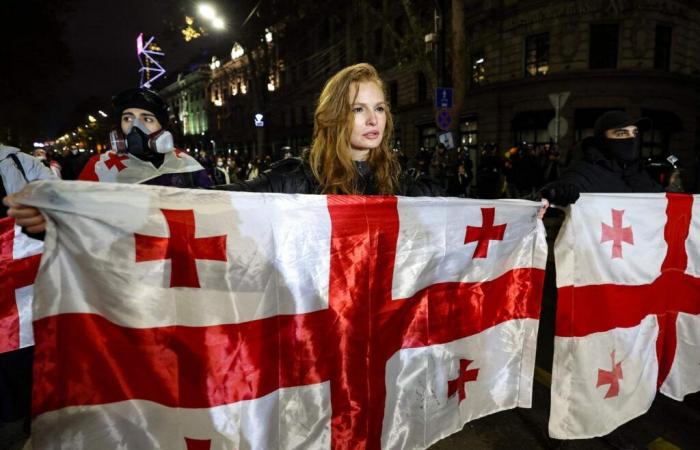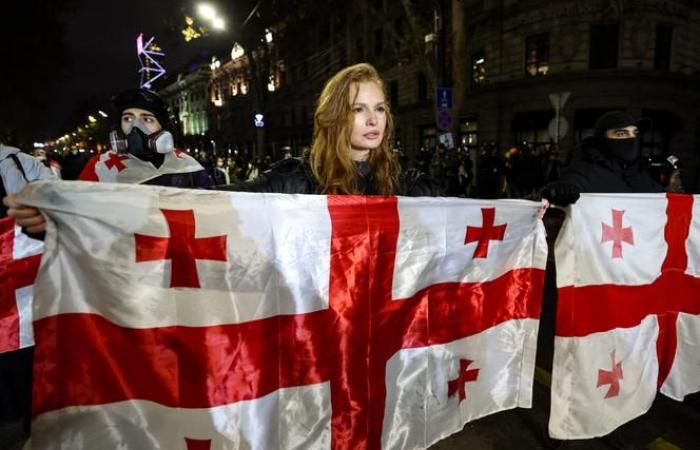The Constitutional Court of Georgia refused, Tuesday, December 3, to invalidate the legislative elections won at the end of October by the ruling party. The opposition has been calling for new elections for more than a month, accusing the Georgian Dream party, in power since 2012, of having distorted the results.
Read also | Article reserved for our subscribers In Georgia, the protest against “the Russian regime” is strengthening, as is the repression of power
Read later
In mid-November, President Salomé Zourabichvili, who has limited powers, and opposition groups filed an appeal with the Constitutional Court to have the results of the vote annulled. On Tuesday, the Court rejected this request, specifying that its decision was « finale » and without appeal. Enough to further fuel the discontent of the thousands of Georgians who have been demonstrating every evening in the capital Tbilisi since Thursday.
They accuse the government of pro-Russian authoritarian drift and of having put on hold the ambitions of membership in the European Union. Thousands of pro-EU demonstrators protested again on Tuesday evening, despite threats from the Prime Minister, who accused his political rivals and NGOs of having “orchestrated the violence” who punctuated the demonstrations.
Georgian police once again used a water cannon on Tuesday to try to disperse a pro-European demonstration in Tbilisi, journalists from Agence France-Presse (AFP) noted. The water cannon created a brief panic, but the protesters quickly started shooting fireworks again at the police, who then used tear gas, when the crowd was in a avenue near Parliament. The Ministry of the Interior accused in a press release demonstrators of having thrown at the police “various types of blunt objects, pyrotechnic devices and flammable objects”.
“Disproportionate” use of force
President Salomé Zourabichvili, who supports the protest movement, has, on the contrary, denounced the use of “disproportionate” force by the police, “mass arrests and ill-treatment”. Accusations supported by the Commissioner for Human Rights, Levan Ioseliani, who reported“acts of torture” of the police towards the demonstrators, after having visited detained and injured protesters.
Most had “serious injuries” to the head or eyes, this public defender said. The location, nature and severity of the wounds suggest that “police use violence against citizens as a punitive measure”he added. “Serious and deliberate violence inflicted in a punitive manner constitutes an act of torture. » Levan Ioseliani notably mentioned the case of a 21-year-old student whose condition is « grave ».
According to the Interior Ministry, 293 demonstrators have been arrested since the start of the movement and 143 police officers have been injured. Demonstrators and journalists have also been injured in recent days.
The ruling party, Georgian Dream, is trying to present the protest movement as the result of external interference, and says it wants to avoid the country's fate like Ukraine, which has been invaded by Russian troops for almost three years. Its officials accuse the West of wanting to drag Georgia into a war with Moscow. Prime Minister Irakli Kobakhidze signed into law earlier this year a law on “foreign influence” seen by its detractors as a legal tool to persecute associations not in line with power.
Pro-European demonstrators
The government, however, assures that it will not give up on Georgia joining the EU despite the announced postponement of any accession negotiations. Irakli Kobakhidze said on Tuesday that dissatisfied Georgians had “misunderstood” and that European integration “progressed”. The day before, he had rejected any negotiations with the opposition, which is demanding new legislative elections by denouncing fraud during the October 26 vote, just like Brussels, which Mr. Kobakhidze described as ” blackmail “.
Read also | Article reserved for our subscribers Georgia postpones its application to join the European Union, the population denounces a betrayal
Read later
The opposition accuses the government of wanting to get closer to Moscow, and of imitating its repressive and authoritarian methods. Georgians therefore march for the EU as much as against neighboring Russia, with the crowd regularly chanting slogans hostile to the Kremlin. Protests also took place elsewhere in the country, such as in Batumi, Georgia's second city, according to local media.
The Memorable World
Test your general knowledge with the editorial staff of “Le Monde”
Test your general knowledge with the editorial staff of “Le Monde”
Discover
“People across Georgia are rising up against the Russian puppet regime”greeted President Salomé Zourabichvili on Monday evening. This former French diplomat assured last week that she would refuse to give up her mandate as planned at the end of December and would remain in her post until new legislative elections are organized. Although it has very limited powers, it is popular with demonstrators, whose movement, largely spontaneous and organized online, has neither a dominant political leader nor a real structure.
The country, nestled on the shores of the Black Sea, remains traumatized by a brief war with Russia in the summer of 2008. Moscow then recognized the independence of two separatist regions bordering its territory, Abkhazia and Ossetia. of the South, where it still maintains a military presence.
Read also | Article reserved for our subscribers “In Georgia, supporting civil society is the only real response to Russia’s hybrid war”
Read later







